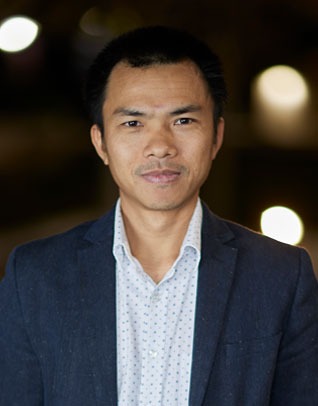Hung Phan
Hung Phan, PhD
I am a scientist and an educator working on the research & education at the interface of chemistry, drug discovery, and computing. My current explorations aim to use artificial intelligence tools to predict properties of molecules and to find the next generations of innovative drugs. Besides academic research, I have a special interest in the transition and outlook of global energy in combating with climate change, and sustainable development in general.
My class is designed with the pedagogy of active learning and project-based learning, which the goal of maximizing student “learning”. With active learning and project-based learning, students also acquire transferable skills such as critical thinking, collaboration, problem-solving, and the metacognitive ability of “learning how to learn”.
- 2011-2016 PhD in Materials Chemistry, University of California, Santa Barbara (UCSB)
- 2007-2009 MS in Environmental Engineering, Gwangju Institute of Science and Technology (GIST), South Korea
- 2002-2006 BS with Honors in Chemistry, Hanoi University of Science (HUS), Vietnam
- Modes of Inquiry
- Integrated Biology Chemistry
- Chemistry and Physics of Colors
- Energy in Daily Life
- Introduction to Machine Learning in Chemistry
- Computer-Driven Drug Discovery (Learning Cluster)
My research group, aptly named 'Comistry', works in the computational exploration of molecules and the discovery of innovative drugs. We merge the rich, century-long knowledge of chemistry with the prowess of Computational Chemistry, Computational Structural Biology, and Machine Learning.
Group website: www.comistrylab.org, https://sites.google.com/view/comistry/research
- Hieu Huynh, Khanh Le, Linh Vu, Matthew Holcomb, Stefano Forli, Hung Phan,* Synergy of Machine Learning and Density Functional Theory calculations for Predicting Experimental Lewis Base Affinity, Journal of Computational Chemistry, 1–10 (2024)
- Hieu Huynh, Thomas J. Kelly, Linh Vu, Tung Hoang, Phuc An Nguyen, Tu Le, Emily A. Jarvis,* Hung Phan,* Quantum chemistry – Machine Learning Approach for Predicting Properties of Lewis acid – Lewis base Adducts, ACS Omega, 8, 19119 (2023)
- Vy Anh Tran, Le Thi Nhu Quynh, Thu-Thao Thi Vo, Phuc An Nguyen, Ta Ngoc Don, Yasser Vasseghian,* Hung Phan,* Sang-Wha Lee,* Experimental and Computational Investigation of Green Knoevenagel Condensation Catalyzed by Zeolitic Imidazolate Framework, Environmental Research, 204, 112364 (2022) * Corresponding authors
- Hung Phan, Thomas J. Kelly, Andriy Zhugayevych, Guillermo C. Bazan, Thuc-Quyen Nguyen, Emily A. Jarvis, and Sergei Tretiak, Tuning Optical Properties of Conjugated Molecules by Lewis Acids: Insights from Electronic Structure Modeling, The Journal of Physical Chemistry Letters, 10, 4632 (2019)
- Hung Phan, Michael J. Ford, Alexander T. Lill, Ming Wang, Guillermo C. Bazan, and Thuc-Quyen Nguyen, Electrical Double-Slope Nonideality in Organic Field-Effect Transistors, Advanced Functional Materials, 28, 1707221 (2018)
- Hung Phan, Michael J. Ford, Alexander T. Lill, Ming Wang, Guillermo C. Bazan, and Thuc-Quyen Nguyen, Improving Electrical Stability and Ideality in Organic Field-Effect Transistors by the Addition of Fullerenes: Understanding the Working Mechanism, Advanced Functional Materials, 27, 1701358 (2017)
- Hung Phan, Matthew D. Yates, Nathan D. Kirchhofer, Guillermo C. Bazan, Leonard M. Tender and Thuc-Quyen Nguyen, Biofilm as a redox conductor: a systematic study of moisture and temperature dependence of its electrical properties, Phys. Chem. Chem. Phys, 18, 17815-17821 (2016)
- Hung Phan, Ming Wang, Guillermo C. Bazan, and Thuc-Quyen Nguyen, Electrical Instability of p-type Field-Effect Transistors from Low Band-gap Donor-Acceptor Polymer Induced by Electron Trapping, Advanced Materials 27, 7004–7009 (2015)
- Hung Phan, Justin P. Jahnke, Bradley F. Chmelka, and Thuc-Quyen Nguyen, Structural and optoelectronic properties of hybrid bulk-heterojunction materials based on conjugated small molecules and mesostructured TiO2. Applied Physics Letters. 104, 233305 (2014)
- Phan Vu Xuan Hung, Seung-Hee Cho, Seung-Hyeon Moon, Prediction of boron transport through seawater reverse osmosis membranes using solution–diffusion model. Desalination. 247, 33–44 (2009).
Full list of publications: https://scholar.google.com/citations?user=dcM7tkcAAAAJ&hl=en
- 2022-present, Visiting Assistant Professor of Chemistry, Soka University of America
- 2018-2022, Founding Faculty Member, Fulbright University Vietnam
- 2016 Best Poster Award, International Conference on Science and Technology of Synthetic Metals, China
- 2016 Mananya Tantiwiwat Fellowship Award, UCSB
- 2015 Dissertation Fellowship, UCSB
- 2015 First Prize, Art of Science Competition, UCSB

